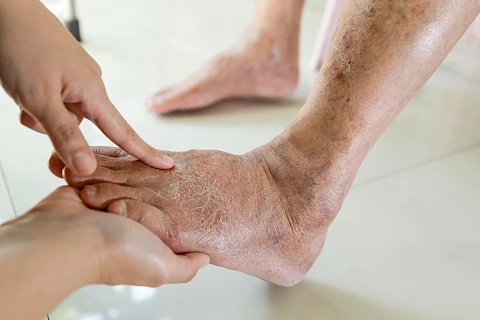
Living with diabetes presents various challenges, particularly for foot health. The condition can reduce blood flow and cause nerve damage, leading to severe complications without proper intervention. Proactive foot care minimizes the risk of foot problems, maintains mobility, and keeps your feet healthy for years to come.
Diabetic Foot Problems in Older Adults
Seniors with diabetes are often vulnerable to specific foot issues, such as ulcers, neuropathy, and infections. Neuropathy, or nerve damage, can result in numbness, making it difficult to detect injuries. Reduced circulation can hinder healing, increasing the risk of severe complications. Awareness of how diabetes affects your feet is the first step in taking preventive measures.
Daily Foot Inspections
Conducting daily foot checks catches potential problems early, minimizing risks. Inspect your feet thoroughly every day. Look for any redness, swelling, blisters, cuts, or calluses. If you spot anything unusual, seek medical attention promptly to prevent infections and complications. Remember, early detection is critical to maintaining good foot health.
Proper Foot Hygiene
Use mild soap and warm water to cleanse your feet daily. Dry them carefully and pay extra attention to the spaces between your toes. Moisturize your feet to prevent dry skin. However, do not apply lotion between the toes, as excessive moisture can cause infections. Trim your nails straight across. Use a nail file to smooth any sharp edges gently. If you have difficulty doing this yourself, consider seeking help from a professional.
Choosing Supportive Footwear
Investing in appropriate footwear is ideal for diabetes management. Supportive shoes can prevent foot injuries. Look for shoes that fit well, provide arch support, and have a wide toe box. Shoes with soft interiors can reduce friction and protect your skin. Avoid wearing high heels or narrow shoes. Also, keep walking barefoot to a minimum.
Managing Blood Sugar Levels
Managing your diabetes is imperative for foot health. High blood sugar can damage nerves and hinder your body's healing ability. Keep your levels stable by following a balanced diet of grains, fruits, and vegetables. Exercise regularly to maintain optimal blood flow. Just remember to consult your doctor before starting a new exercise regimen. Your healthcare provider can also establish a personalized plan for blood sugar management. Make sure to stick to it to protect your feet.
Regular Check-Ups With a Podiatrist
Regular visits to a podiatrist can identify issues before they become severe. A podiatrist specializes in foot care and can guide you on proper foot care. They can also recommend necessary interventions, ensuring your feet remain healthy and functional. Consider scheduling a visit to a podiatrist at least once a year or more frequently, depending on individual needs. These appointments are an opportunity to discuss any changes or concerns you may have.
Senior Helpers Can Provide Care for Diabetes and Other Chronic Conditions
Taking proactive steps prevents diabetic foot problems. If you can benefit from the additional support of a senior home care provider, partner with Senior Helpers Rhode Island. We specialize in tailored senior in-home care services, including help with daily tasks, assistance with personal hygiene, transportation and appointments, chronic disease care, and more. Contact us today for top-notch senior care in Cumberland, Coventry, Pawtucket, Warwick, and Providence!